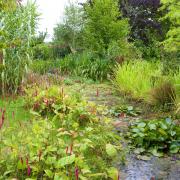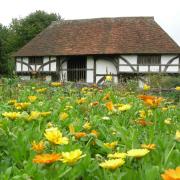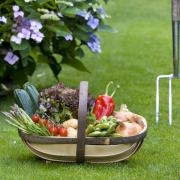Owning an allotment has not been this popular since the 'Dig for Victory' campaign during the Second World War. But what could they possibly offer us in the 21st century? Nancy Cremore looks at the appeal of plot owning and meets the people who kn...
Sussex Life, September 2007
EVERYBODY wants to eat healthily these days. But visits to farmers' markets, having vegetable boxes delivered to your door from local farms and eating seasonally and organically are not enough for some people. They are doing it for themselves - on their own allotments. And allotments have become so popular that acquiring one is easier said than done.
With 1,700 people waiting for an allotment in Brighton and Hove alone, some councils have had to close their waiting lists. To make matters worse, our renewed desire to get back to nature comes at a time when councils are being put under increased pressure from the government to consider allotment space for development.
01858 438832
However, keeping up demand is the best way to ensure councils honour their legal obligation to supply land to individuals for growing food. We have a right to feed ourselves and know how food is grown and what it contains.
The last time there was such a huge interest in allotments was during World War Two, only the need was slightly more pressing then. Realising that the country was facing an imminent food shortage, the government launched its famous 'Dig for Victory' campaign in 1939, urging everyone on the home front to start allotment gardening.
Formal gardens, lawns and sports pitches were turned into vegetable patches (Kensington Gardens even dug up its flowers and planted rows of cabbages) and 1.4 m illion people took part.
The scheme was so successful that imports of food halved during the war and by 1943 more than a million tons of vegetables were being grown in both gardens and allotments in the UK.Allotments definitely have their roots in necessity: As early as the 1500s, when common lands began to be enclosed, commoners were compensated with allocations or 'allotments' of land attached to tenant cottages to allow them to grow their own food.
But by end of the18th century, private Acts of Parliament actually allowed landowners to enclose common fields which meant less and less land for the peasants. And with the population migrating to towns and cities, fear of revolt led to the General Enclosure Act of 1845, which said that authorities could only enclose land on the condition that some was set aside for allotment use.
In 1887 the Allotment Act came in, which forced local authorities to provide allotments if there was demand, and this legislation is still mostly in force today.
Fast forward to the present and it's clear that allotment owning is much more about pleasure, eating healthily, fresh air, exercise and the feeling that we're 'getting back to nature'. On the following pages, we meet some people already enjoying the benefits, and if you fancy giving it a go, contact your local council to check for available sites.
Have a go: Easy plants
Spring: potatoes, onion sets, strawberries, asparagusEarly summer (after frosts): runner beans, French beans, pumpkins, courgette, tomatoes, peppers.Autumn: perpetual spinach, pak choi, spring cabbage, purple sprouting broccoli (look out for special offers of plug plants in newspapers and magazines).Winter: shallots, broad beans, raspberries, red and blackcurrants, gooseberries and fruit trees.
The Green aspirer Chesworth, Horsham
Alex Embling is an internet consultant from Horsham who has taken on a plot to go green and teach his children about food. "It's important to teach kids about nature," he says. "The next generation will be greener than us - they'll be green by default." Alex, 36, and his marketing manager wife Sally have two young children, Ben, two and Madeleine, five months. "Our generation doesn't have a clue about gardening," says Alex. "But the guy who owns the place assures me that everything you need to know is on the back of a seed packet. People are also very good at offering advice, whether you want it or not!"
Alex works from home, and his plot is a handy ten-minute walk away. "We'd like to get up here a couple of days a week, but in reality it will be more like a couple of hours," says Alex. "Although when the kids are a bit older we'll be down here much more."His extremely overgrown plot, which became his three months ago, costs him £19 a year in rent and Alex says his first project is to "get the whole area strimmed away and cleared, then let it all rot down until next year." After that "we'll try runner beans, potatoes, tomatoes - anything that the kids can help out with.
"I'm going to enjoy finding out when to plant, what's in season and looking into ways of planting organically," says Alex. "We need to find out things that our grandparents knew instinctively."
The woman's touch Chesworth, Horsham
Women make up the fastest-growing group of allotment holders. Some 59,000 of the nation's 330,000 plots are now rented by women, according to the Allotments Regeneration Initiative, which supports and promotes urban allotments.
Health and social care worker Alison Paul, 49, has had her plot for four and a half years: "There are as many women as men up here these days. It's the other way round now- we're trying to get away from our husbands and kids! "I come up here most evenings when I'm not working," says Alison. "I like it best in the evenings when the weather is cool and no one needs me at home."
Alison decided she should give allotment gardening a go when her youngest child brought home some beans he'd grown at school. "The taste was amazing, so different that it really inspired me to give it a try," she says. "A friend of mine told me about the plot down here; it's such a lovely spot. There were a few going at the time so I didn't have to wait, I really had no excuse!"
Alison started off doing easier things like "potatoes and courgettes, beans, peas, rocket and fruit bushes. I've started growing asparagus, but you have to wait until your third year before you can eat it. "I try to grow as organically as possible," says Alison. "I rely a lot on ladybirds. If I see any I move them! And I try to grow lupins to attract the bees.
"I love being outside with the elements. There's a sense that you're seeing the bigger picture. You can't change nature, after all."
The veteran, Coldean, Brighton
Geoff Noakes, who is 70, has been renting his plot for 37 years and has crammed it full with "everything except spinach," rows and rows of flowers and a shed well-stocked with home-made sloe gin, cassis, redcurrant vodka and blackberry whisky - all courtesy of his plot...
01858 438832


























